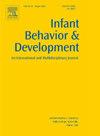Differential roles of problematic media use by mothers and toddlers in the relation between parenting stress and toddlers’ socioemotional development
IF 1.9
3区 心理学
Q3 PSYCHOLOGY, DEVELOPMENTAL
引用次数: 0
Abstract
The increasing prevalence of digital media devices in families with young children has raised concerns over problematic media use. However, the link between toddlers’ problematic media use, their socioemotional development, and the influence of parental factors remains unclear. The current study examined the roles of problematic media use by both mothers and toddlers in the association between maternal parenting stress and toddlers’ socioemotional development. Participants comprised 215 mothers and 73 lead child care classroom teachers of toddlers aged 24–36 months enrolled in child care centers in South Korea. Mothers reported parenting stress and problematic media use by themselves and their toddlers, and child care teachers reported toddlers’ socioemotional development. The results from structural equation modeling analysis revealed that maternal parenting stress was related to toddlers’ socioemotional development both directly and indirectly through toddlers’ problematic media use, both alone and in conjunction with mothers’ problematic media use. Although maternal parenting stress was related to mothers’ problematic media use, mothers’ problematic media use was not directly related to toddlers’ socioemotional development. These findings underscore the importance of toddlers’ problematic media use in their socioemotional development and highlight the need for comprehensive approaches that address family dynamics, such as maternal parenting stress and problematic media use.
母亲和幼儿使用问题媒体在育儿压力与幼儿社会情感发展关系中的不同作用。
数字媒体设备在有小孩的家庭中越来越普遍,这引起了人们对媒体使用问题的关注。然而,幼儿有问题的媒体使用、他们的社会情感发展和父母因素的影响之间的联系尚不清楚。目前的研究调查了母亲和幼儿使用有问题的媒体在母亲养育压力和幼儿社会情感发展之间的关系中的作用。参与者包括215名母亲和73名在韩国托儿中心注册的24-36个月 幼儿的幼儿班主任。母亲报告了自己和幼儿的育儿压力和有问题的媒体使用情况,幼儿教师报告了幼儿的社会情感发展情况。结构方程模型分析结果显示,母亲育儿压力通过幼儿的问题媒体使用直接或间接地影响幼儿的社会情感发展,无论是单独使用还是与母亲的问题媒体使用共同影响。虽然母亲的养育压力与母亲的问题媒体使用有关,但母亲的问题媒体使用与幼儿的社会情感发展没有直接关系。这些发现强调了幼儿有问题的媒体使用在他们的社会情感发展中的重要性,并强调了解决家庭动态的综合方法的必要性,例如母亲养育压力和有问题的媒体使用。
本文章由计算机程序翻译,如有差异,请以英文原文为准。
求助全文
约1分钟内获得全文
求助全文
来源期刊

Infant Behavior & Development
PSYCHOLOGY, DEVELOPMENTAL-
CiteScore
4.10
自引率
4.80%
发文量
94
期刊介绍:
Infant Behavior & Development publishes empirical (fundamental and clinical), theoretical, methodological and review papers. Brief reports dealing with behavioral development during infancy (up to 3 years) will also be considered. Papers of an inter- and multidisciplinary nature, for example neuroscience, non-linear dynamics and modelling approaches, are particularly encouraged. Areas covered by the journal include cognitive development, emotional development, perception, perception-action coupling, motor development and socialisation.
 求助内容:
求助内容: 应助结果提醒方式:
应助结果提醒方式:


